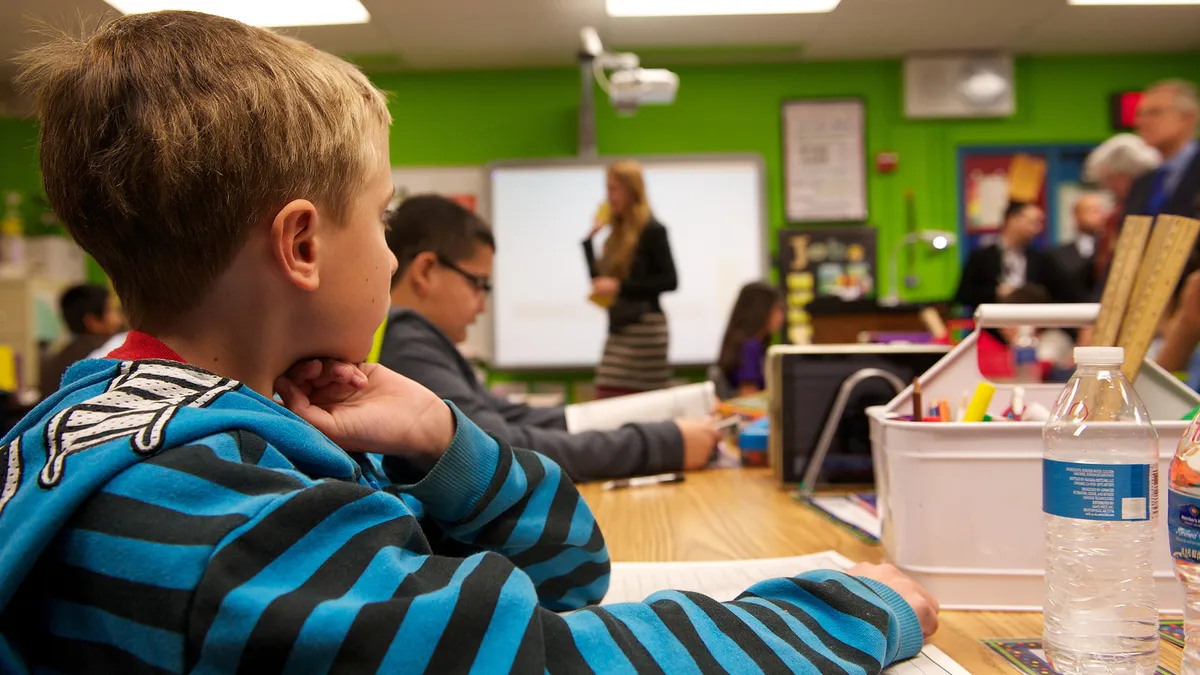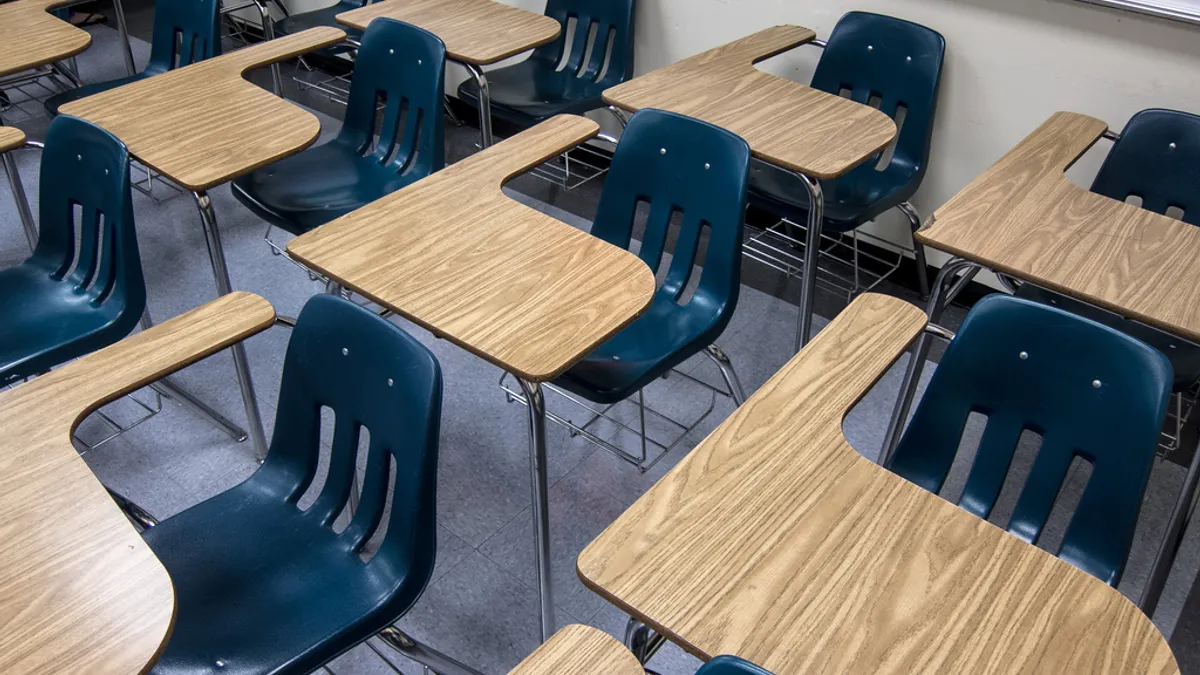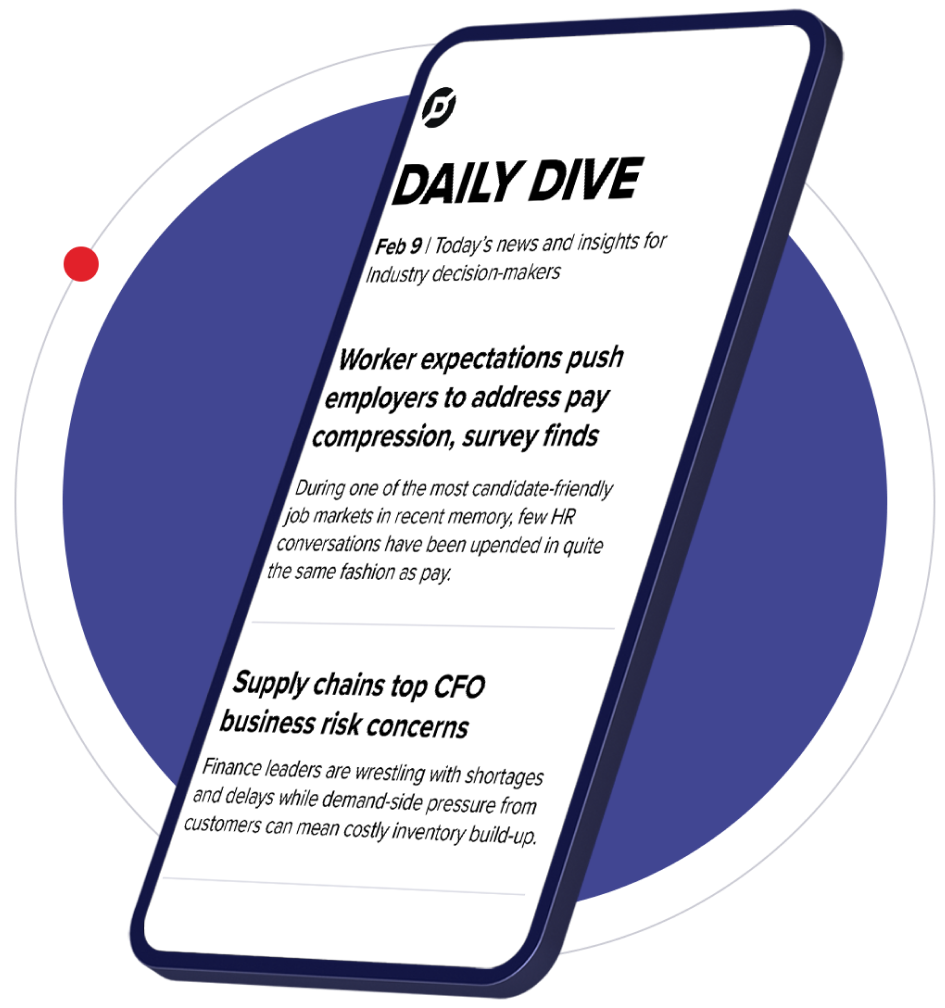K-12: Page 172
-
Personalized learning, teacher development key for special ed students
The California Charter Schools Association has released a list of guidelines for successful special education programs, based on research on best practices from 10 schools statewide.
By Autumn A. Arnett • April 11, 2017 -
Professional development at the heart of school success
American Federation of Teachers President Randi Weingarten laid out 4 critical considerations for the future of schools during a Tuesday morning panel at The Atlantic's education summit.
By Autumn A. Arnett • April 11, 2017 -
Trendline
Curriculum
Educators are exploring a variety of strategies to improve students’ learning experiences while continuing to navigate ongoing political disputes.
By K-12 Dive staff -
CBE remains more popular with older students — but K-12 trends could change that
Just 10% of undergrads at CBE institutions examined in a recent study were under the age of 25, but initiatives in K-12 could see those demographics shift.
By Roger Riddell • April 10, 2017 -
Superintendent takes 'glow and grow' approach to community engagement
Starting with the knowledge that only 40-50% of the school community had internet access, Virginia's Charles City Public Schools set out to gather initial data using paper surveys.
By Roger Riddell • April 10, 2017 -
Santa Ana USD digital transition highlights importance of professional learning
When the district recently put 45,000 devices in the hands of 56,000 students, it employed the services of other district leaders who had overseen successful rollouts.
By Roger Riddell • April 10, 2017 -
Indiana weighs virtual preschool program
Legislators are considering a $2 million investment that would give all families in the state access to kindergarten-prep software.
By Autumn A. Arnett • April 10, 2017 -
Opinion
Principals for kindness: How to instill empathy in the classroom
In truth, kindness is rarely overtly built into curricula or assessment at schools.
By Gabriella Rowe • April 10, 2017 -
AltSchool adds 4 K-12 administrators to executive team
The new additions come as the company steps up efforts to prepare its platform for wide-scale use by public, charter and private schools by 2020.
By Roger Riddell • April 7, 2017 -
Maryland Gov Hogan blasts 'unreasonable' professional days, defends later start date
Compromising professional development, however, could lead to unintended consequences in schools.
By Autumn A. Arnett • April 6, 2017 -
How are educators exploring alternative assessment methods?
Digital portfolios and progress measuring are among methods being explored.
By Roger Riddell • April 6, 2017 -
Deep Dive
Chicago Public Schools leads on SEL with collaborative approach to implementation
The district set a vision in 2012 to improve social emotional learning across its 650 schools then asked each school to do its own needs assessment to identify the best path forward.
By Tara García Mathewson • April 6, 2017 -
Chicago students would be required to prove post-graduation plans to get diploma
Many are questioning the move's legality and enforceability, but supporters say it doesn't add any undue burden.
By Autumn A. Arnett • April 6, 2017 -
Deep Dive
Moving past students' 'islands of challenge' to encourage academic success
Beacon College President George Hagerty speaks about his institution's unique mission and strategies for working with students with learning challenges at every level.
By Autumn A. Arnett • April 5, 2017 -
Can therapy dog programs improve student outcomes?
For students struggling with emotional or learning disorders or challenging relationships, therapy dogs may offer a cost-effective, comforting presence that can help them focus.
By Roger Riddell • April 5, 2017 -
Teacher agency at center of New Hampshire CBE advancements
Giving educators a seat at the table and freedom to innovate without fear of state guidelines has boosted the state's push toward competency-based K-12.
By Roger Riddell • April 5, 2017 -
An annual Hour of Code isn't enough for sustained learning
Simply piquing students' interest in a topic once a year won't impart the lasting benefits of ongoing study.
By Roger Riddell • April 5, 2017 -
ESSA plans start rolling in to Ed Dept
Some states stuck with original intent to submit their action plans by the April 3 deadline.
By Autumn A. Arnett • April 5, 2017 -
Illinois schools experiment with competency-based education model
Proficiency rubrics will replace letter grades, and students will be required to demonstrate mastery of both academic and adaptive competencies before moving on to the next level.
By Autumn A. Arnett • April 4, 2017 -
Engaging with Gen Z parents more difficult, but necessary
Solid school–parent communication is crucial to student success, but a lack of progress can make connecting with parents of Generation Z students more difficult.
By Roger Riddell • April 4, 2017 -
Flexible seating works for the youngest learners, too
Students in the earliest grades can learn to recognize where and how they work best — standing, laying on the floor, or sitting on a variety of furniture options.
By Roger Riddell • April 4, 2017 -
With self-regulating energy systems, IoT offers savings for ed
Tools that can regulate HVAC and lighting systems might also bring benefits beyond financial savings.
By Roger Riddell • April 4, 2017 -
Family engagement critical to success of dual enrollment programs
While most public high schools in the U.S. offer joint high school-college enrollment, students of color are often left out of the fold.
By Autumn A. Arnett • April 4, 2017 -
Personalized learning strategies prove particularly helpful for ELLs
The Varnett Public School in Houston has found great gains in English proficiency among its ELL students by utilizing interactive language software to help supplement instruction for students.
By Autumn A. Arnett • April 4, 2017 -
Fewer than 1% of engineering degrees went to African-American women in 2015
The number is highlighted in a new paper from Purdue University, NSBE, the Society of Women Engineers and the Women in Engineering ProActive Network.
By Roger Riddell • April 3, 2017 -
Deep Dive
California Partnership Academies put students on a path to career
The Westlake Information Technology Academy at Southern California’s Westlake High School gives students an early window into game design and computer simulation.
By Tara García Mathewson • April 3, 2017





